|
|
| Sei in: Cinema e Medioevo ® Vampiria. Tutti i film sui vampiri ® I film in ordine alfabetico (1896-oggi) |
Perdues dans New York
1989, regia di Jean Rollin
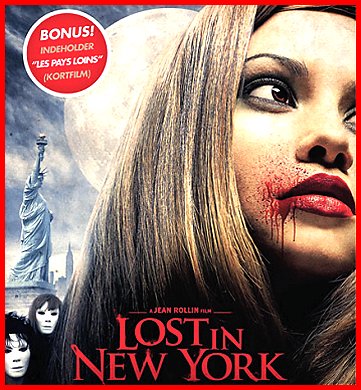
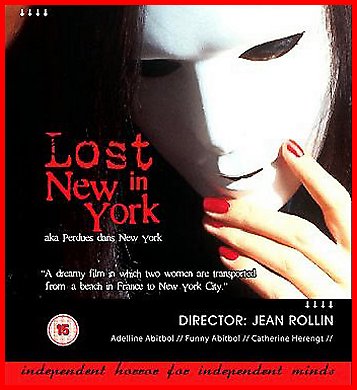
Scheda: Nazione: Francia - Produzione: Les Films A.B.C., Mars International Productions, Francam Interservice - Distribuzione: Filmfreak Distributie, Lucertola Media - Soggetto: Jean Rollin - Sceneggiatura: Jean Rollin - Fotografia: Max Monteillet - Montaggio: Janette Kronegger - Musiche: Philippe D'Aram - Effetti speciali: Rn - Formato: Color - Durata: 52' (67').
Cast: Adeline Abitbol, Funny Abitbol, Catherine Herengt, Catherine Lesret, Sophie Maret, Marie-Laurence, Mélissa, Nathalie Perrey, Catherine Rival.
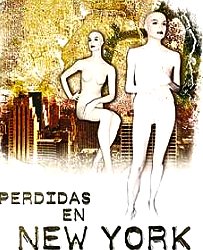
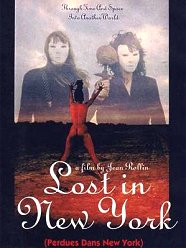
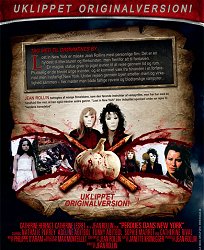
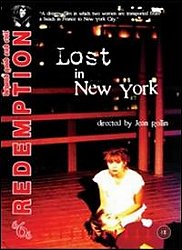
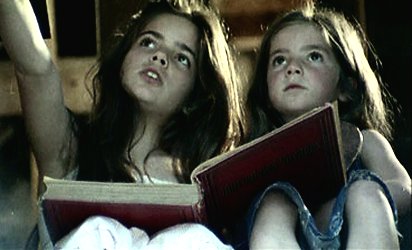
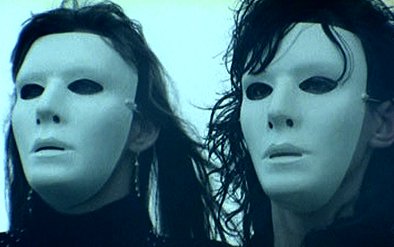
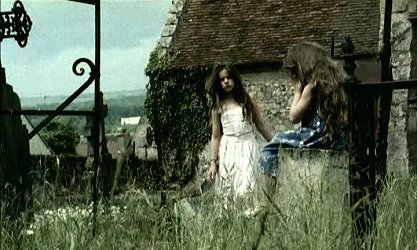
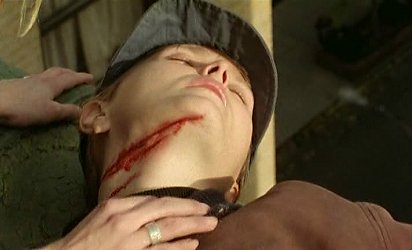
![]() Trama e commenti:
thrauma.it -
filmscoop.it -
ilcancello.com: «Si
tratta della fantastica storia di due bambine che viaggiano (con
l'immaginazione?) nel tempo e nello spazio... e a un certo punto si ritrovano
adulte a New York... Come al solito più che la storia contano le invenzioni
visive fantastiche e surreali... Non è propriamente un horror (anche se ha una
scena di vampirismo), ma sicuramente è uno dei film migliori e più personali di
Rollin».
Trama e commenti:
thrauma.it -
filmscoop.it -
ilcancello.com: «Si
tratta della fantastica storia di due bambine che viaggiano (con
l'immaginazione?) nel tempo e nello spazio... e a un certo punto si ritrovano
adulte a New York... Come al solito più che la storia contano le invenzioni
visive fantastiche e surreali... Non è propriamente un horror (anche se ha una
scena di vampirismo), ma sicuramente è uno dei film migliori e più personali di
Rollin».
![]() Plot Summary, Synopsis, Review:
IMDb -
allmovie.com
-
vampyres-online.com -
terrorfantastico.com -
esotikafilm.com -
es.filmamora.com -
play.com -
abandomoviez.net -
anotherworldent.com -
vampires.nu -
ovguide.com -
dvdoutsider.co.uk: «If
you don't know the work of French director Jean Rollin then one thing's for sure
– you're not a vampire movie fan, or at least not a hardcore one. Rollin began
making films in 1958, but ten years later created what is credited as the first
French vampire film
Le Viol du vampire (aka Queen of the Vampires,
aka The Rape of the Vampire), and despite the film's initially shaky
reception, Rollin has never looked back. At a time when Hammer's once-popular
output was fading, Rollin was creating stylish, poetic fantasy films that were
as influenced by expressionism and the avant garde as they were by classic
Hollywood horrors. Rollin's vampire films in particular embraced the genre's
underlying eroticism, and though he worked cheap and fast, his evocative use of
locations and music, the poetry of his stories and characters and his sometimes
dream-like imagery put his best films in a class that most higher budgeted
mainstream productions could only dream of entering. Allegedly a semi-improvised
experiment, in which footage spontaneously shot by Rollin and his two actresses
on a trip to New York was expanded on and given structure on their return to
France, Lost in New York enigmatically blurs the distinctions between
reality, memory, dreams, imagination and the supernatural. An old woman, Michèle,
recalls a childhood encounter with Marie, a young girl she finds crying in a
presbytery garden because she has no-one to play with. She is holding a statue
of a figure she believes is the Moon Goddess and invites Michèle to go on a
journey with them, one that involves a picture book that allows its young
readers to dream, or perhaps to be physically transported in time and space, to
a beach populated by masked spirits, to early womanhood and to another continent.
In New York the two girls, now older, find themselves lost and separated, but
drawn to find each other in a place very different to the one they have just
left. Alternately literate, playful and suggestive, Lost in New York is
in some ways one of Rollin's most personal films, uniting elements and imagery
from his earlier work and his own fascination with cinema, evident in the
influence of the past films of his countrymen and the picture-book trip through
favourite movies and characters that the two young girls might allow themselves
to become. Intriguingly, the sometimes landmark view of New York remains an
outsider's one, a cinematically familiar location that remains as alien to us as
it is to Marie and Michèle. We are tourists here, lost in a city where the two
girls can be within yards of each other and yet fail to connect, where roses are
handed to each by the same passer-by, where an attempted mugging can result in
death, and where vampires feed on willing victims after nightfall, only to
perish with the rising sun. "Fantasies die at dawn," the stony male voice-over
reminds us, having already suggested that at least part of what we are watching
is a shared dream. A typically atmospheric music score, here by Philippe d'Aram,
contributes to the film's sense of reality dislocation. ...».
Plot Summary, Synopsis, Review:
IMDb -
allmovie.com
-
vampyres-online.com -
terrorfantastico.com -
esotikafilm.com -
es.filmamora.com -
play.com -
abandomoviez.net -
anotherworldent.com -
vampires.nu -
ovguide.com -
dvdoutsider.co.uk: «If
you don't know the work of French director Jean Rollin then one thing's for sure
– you're not a vampire movie fan, or at least not a hardcore one. Rollin began
making films in 1958, but ten years later created what is credited as the first
French vampire film
Le Viol du vampire (aka Queen of the Vampires,
aka The Rape of the Vampire), and despite the film's initially shaky
reception, Rollin has never looked back. At a time when Hammer's once-popular
output was fading, Rollin was creating stylish, poetic fantasy films that were
as influenced by expressionism and the avant garde as they were by classic
Hollywood horrors. Rollin's vampire films in particular embraced the genre's
underlying eroticism, and though he worked cheap and fast, his evocative use of
locations and music, the poetry of his stories and characters and his sometimes
dream-like imagery put his best films in a class that most higher budgeted
mainstream productions could only dream of entering. Allegedly a semi-improvised
experiment, in which footage spontaneously shot by Rollin and his two actresses
on a trip to New York was expanded on and given structure on their return to
France, Lost in New York enigmatically blurs the distinctions between
reality, memory, dreams, imagination and the supernatural. An old woman, Michèle,
recalls a childhood encounter with Marie, a young girl she finds crying in a
presbytery garden because she has no-one to play with. She is holding a statue
of a figure she believes is the Moon Goddess and invites Michèle to go on a
journey with them, one that involves a picture book that allows its young
readers to dream, or perhaps to be physically transported in time and space, to
a beach populated by masked spirits, to early womanhood and to another continent.
In New York the two girls, now older, find themselves lost and separated, but
drawn to find each other in a place very different to the one they have just
left. Alternately literate, playful and suggestive, Lost in New York is
in some ways one of Rollin's most personal films, uniting elements and imagery
from his earlier work and his own fascination with cinema, evident in the
influence of the past films of his countrymen and the picture-book trip through
favourite movies and characters that the two young girls might allow themselves
to become. Intriguingly, the sometimes landmark view of New York remains an
outsider's one, a cinematically familiar location that remains as alien to us as
it is to Marie and Michèle. We are tourists here, lost in a city where the two
girls can be within yards of each other and yet fail to connect, where roses are
handed to each by the same passer-by, where an attempted mugging can result in
death, and where vampires feed on willing victims after nightfall, only to
perish with the rising sun. "Fantasies die at dawn," the stony male voice-over
reminds us, having already suggested that at least part of what we are watching
is a shared dream. A typically atmospheric music score, here by Philippe d'Aram,
contributes to the film's sense of reality dislocation. ...».
![]() Approfondimenti:
Movie
Review
Approfondimenti:
Movie
Review
Conosciuto anche con il titolo: Lost in New York.
|
Visitatori
da ottobre 2004 ad oggi: |